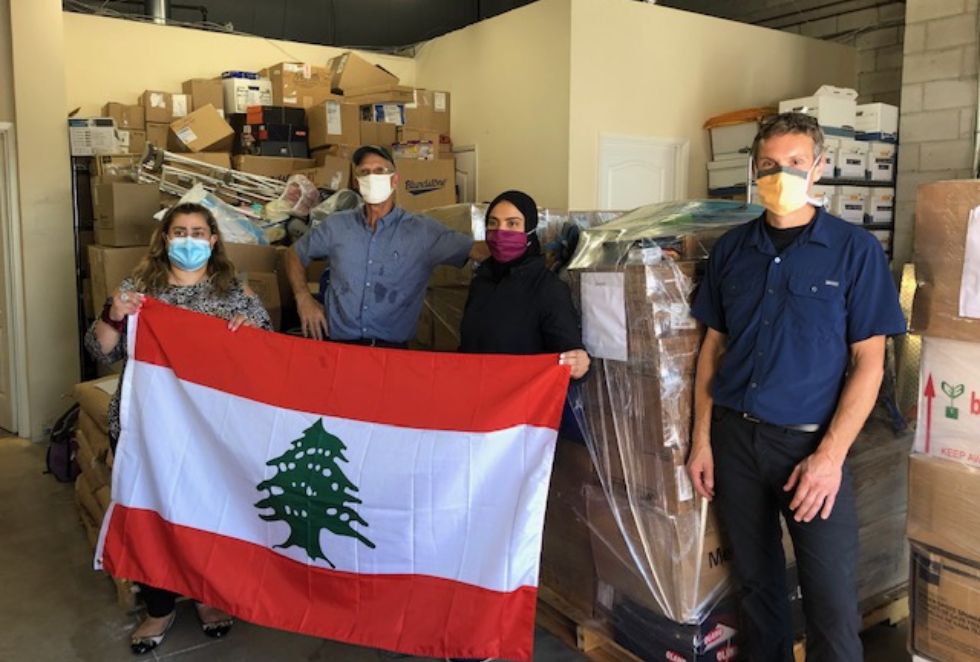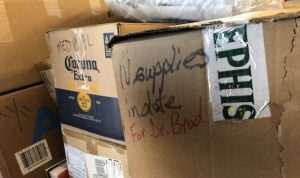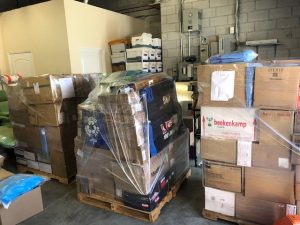McMaster partners with Rotary to send much-needed medical supplies to Lebanon

Dr. Brad Petrisor (far right) and other volunteers gather medical supplies to ship to Beirut, Lebanon. Photo courtesy of Brad Petrisor
It started with a single phone call, one colleague to another.
Two days after two deadly explosions in Beirut, Lebanon killed at least 200 people and injured more than 6,000, Mohit Bhandari, the immediate past chair of the Division of Orthopedic Surgery at McMaster, called Brad Petrisor, a fellow surgeon and head of the university’s Department of Surgery’s International Surgery Desk.
Bhandari had been on the phone with a surgeon at one of Beirut’s hospitals, and the situation was grim. Not only were there huge numbers of people with significant injuries, but three of the city’s hospitals had been demolished and there was a shortage of emergency supplies and equipment.
Petrisor had been on medical trips overseas before: to Uganda, to Haiti, to India. He’d had some experience in disaster relief – but what was needed in Beirut was on a whole different scale.

So that single phone call became another one. Then another. And another.
Petrisor reached out to colleagues at McMaster, Hamilton Health Sciences and other institutions. He also called Doug Vincent, from his hometown of Woodstock, Ontario. Vincent was a long-time member of Woodstock’s Rotary Club – a service organization with a long history of dealing with logistics and complexities of providing international aid.
Rotary connected with a series of organizations, including the Medical Recycling Depot in Stratford, Ontario, and Warehouse of Hope and Not just Tourists in Stoney Creek, who had collections of medical supplies to add to what had been collected by McMaster and Hamilton Health Sciences.

Now, there are three skids of urgent-care supplies ready for air shipment to Beirut, with a shipping container of other equipment, including crutches and orthopedic implants, to be sent as more items are gathered and funds for shipping costs are raised.
Rotary is continuing to ask for donations of medical supplies, logistics help and, especially, financial contributions to pay for shipping costs – which McMaster colleagues are matching. The Lebanese community is also contributing support.
And while Petrisor says that the instinct for most caring people – especially doctors – is to jump in with both feet when people need help, he also points out that they’re being careful to provide the kind of help that’s most needed.
“In speaking with medical colleagues in Lebanon, we know that they don’t necessarily need doctors – there are lots of good doctors there – they need supplies, so it’s been ideal to partner with Rotary because they have so much experience in this area,” explained Petrisor from a cube van, hands free of course, on his way to the warehouse in Stratford to pick up the donated supplies. “From here, we’re able to offer much-needed emotional support and figure out the logistics of getting our colleagues the materials they need, as quickly as possible.”
To contribute to the fundraising efforts to send medical supplies to Beirut, go to the Rotary fundraising page on Canada Helps. Follow Rotary Helps Lebanon on Facebook for further updates.

